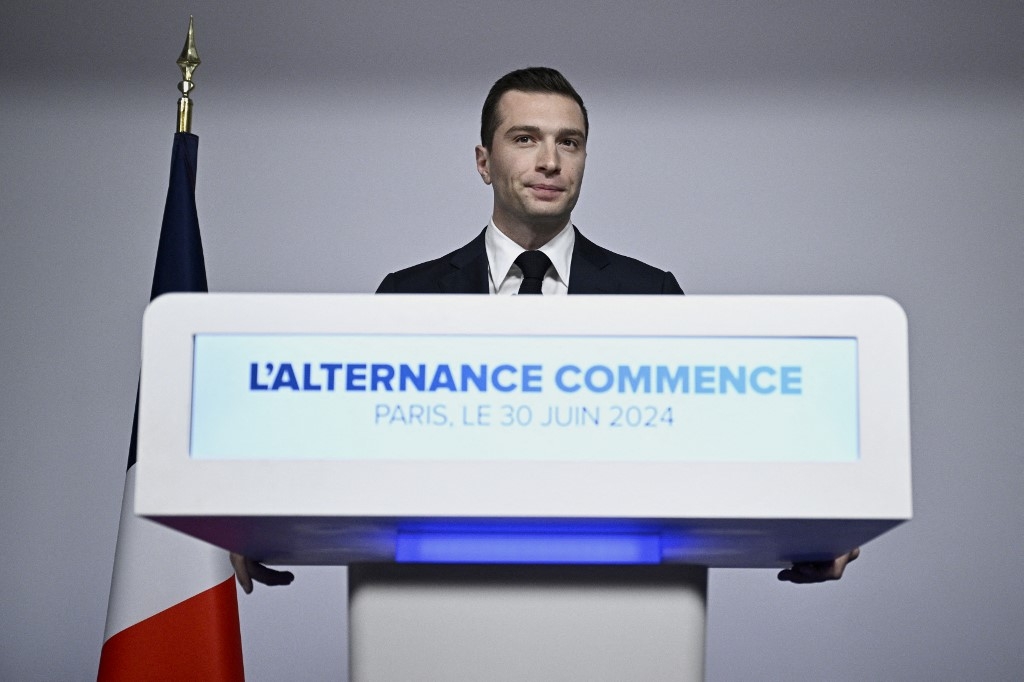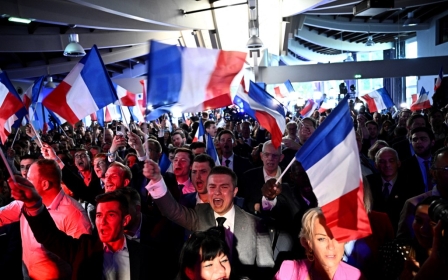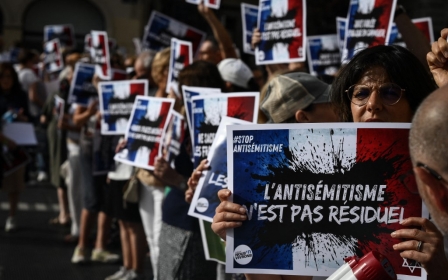France elections: Jordan Bardella and the far right 'at the gates of power'

France has entered a decisive week of political negotiations following the first round of legislative elections that saw the far-right National Rally (RN) come out well ahead of its rivals and near its objective of forming a government and claiming the post of prime minister.
Three weeks after the RN caused a political earthquake by winning the European elections, prompting President Emmanuel Macron to dissolve France's parliament, the National Assembly, the French voted in massive numbers on Sunday.
Sixty-six percent of registered voters went to the polls, way above the turnout of just 47.5 percent in the 2022 elections.
With 33.14 percent of the votes, the RN and its allies obtained their best result in the first round of an election, according to the latest estimates.
The New Popular Front, an alliance of left-wing parties, came second with 27.99 percent, far ahead of Macron’s camp with 20.04 percent.
New MEE newsletter: Jerusalem Dispatch
Sign up to get the latest insights and analysis on Israel-Palestine, alongside Turkey Unpacked and other MEE newsletters
The French “rendered an irrevocable verdict”, RN’s president Jordan Bardella said on Sunday night.
Thirty-nine RN MPs were elected in the first round, compared with 32 for the New Popular Front.
“We need an absolute majority,” said Marine Le Pen, the leader of the French far-right party. She was elected in the first round in the North department.
If Bardella becomes prime minister, it would be the first time a far-right government leads France since World War Two, when an unelected collaborationist regime based in Vichy was established while the country was occupied by Nazi Germany.
This would create a tense period of "cohabitation" with Macron, who has vowed to serve out his term until 2027. That would make the president a far less powerful figure for the remaining three years of his term.
‘Republican front’
Bardella said he would only form a government if the RN wins an absolute majority in the elections.
While the traditional "republican front" against the far right appears less systematic than in the past, his party is able to obtain a strong relative majority or even an absolute majority in the second round next Sunday.
In a statement, Macron called for a "broad" alliance against the far right in the second round, which will see run-off votes where there was no outright winner in the first round.
The left-wing alliance and the president’s camp will be hoping that tactical voting to prevent RN candidates winning seats will leave it short of an absolute majority.
French Prime Minister Gabriel Attal, who is likely to be forced to resign after the second round, warned the far right was now at the "gates of power". The RN should not get a "single vote" in the second round, he said.
"We have seven days to spare France from catastrophe," said Raphael Glucksmann, a key figure in the left-wing New Popular Front alliance.
On Sunday evening, around a hundred organisations in France, including trade unions, called on the public to vote against the RN in the second round. “Not a single vote must be missing from the defeat of the RN,” said the signatories of this appeal, drawn up at the initiative of the League for Human Rights (LDH), a leading French rights group.
The RN, which has made the fight against immigration and “national preference” - the concept of prioritising non-migrant French communities - the primary focus of its platform, has drawn accusations of xenophobia and discrimination against minorities, particularly Muslims and people of African descent.
The scenario of a National Assembly with no possible majority coalition between the three political blocs also remains a possibility.
This would plunge France into the unknown and potentially months of political paralysis and negotiations to find a solution for a sustainable government that can survive no-confidence votes.
Middle East Eye delivers independent and unrivalled coverage and analysis of the Middle East, North Africa and beyond. To learn more about republishing this content and the associated fees, please fill out this form. More about MEE can be found here.





